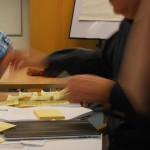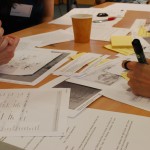I presented a short paper 'On the Internet, nobody knows you’re a historian: exploring resistance to crowdsourced resources among historians' (abstract, video) at Digital Humanities 2012 in Hamburg, Germany.
I've posted a version of my research as it was at that stage as a post on Open Objects: Early PhD findings: Exploring historians' resistance to crowdsourced resources.
My abstract (written a long time previously) is below:
Crowdsourcing, the act of taking work once performed within an organisation and outsourcing it to the general public in an open call (Howe 2006), is increasingly popular in memory institutions as a tool for digitising or computing vast amounts of data, as projects such as Galaxy Zoo and Old Weather (Romeo & Blaser 2011), Transcribe Bentham (Terras 2010) and the Australian Newspapers Digitisation Program (Holley 2010) have shown. However, the very openness that allows large numbers of experts and amateurs to participate in the process of building crowdsourced resources also raises issues of authority, reliability and trust in those resources. Can we rely on content created by pseudonymous peers or members of the public? And why do academics often feel that they can’t? This paper explores some of the causes and forms of resistance to creating and using crowdsourced resources among historians.
‘Participant digitisation’ is a specialised form of crowdsourcing in which the digital records and knowledge generated when researchers access primary materials are captured at the point of creation and potentially made available for future re-use. Through interviews with academic and family/local historians, this paper examines the following: the commonalities and differences in how these two groups assess the provenance, reliability and probable accuracy of digital resources; how crowdsourcing tools might support their working practices with historical materials; the motivations of historians for sharing their transcriptions and images in a public repository; the barriers that would prevent them from participating in a project that required them to share their personally-digitised archives; and the circumstances under which they would selectively restrict content sharing. From this preliminary investigation, the paper will go on to consider implications for the creation of digital humanities resources for academic and amateur users.
References
Holley, R. (2010). Crowdsourcing: How and Why Should Libraries Do It? D-Lib Magazine 16(3/4).
Howe, J. (2006). The Rise of Crowdsourcing. Wired 14.06. [Online] Available from: http://www.wired.com/wired/archive/14.06/crowds.html
Romeo, F., and L. Blaser (2011). Bringing Citizen Scientists and Historians Together. In J. Trant and D. Bearman (eds), Museums and the Web 2011: Proceedings. Toronto: Archives & Museum Informatics.
Terras, M. (2010). Digital curiosities: resource creation via amateur digitization. Literary and Linguistic Computing 25(4), 425-438.


